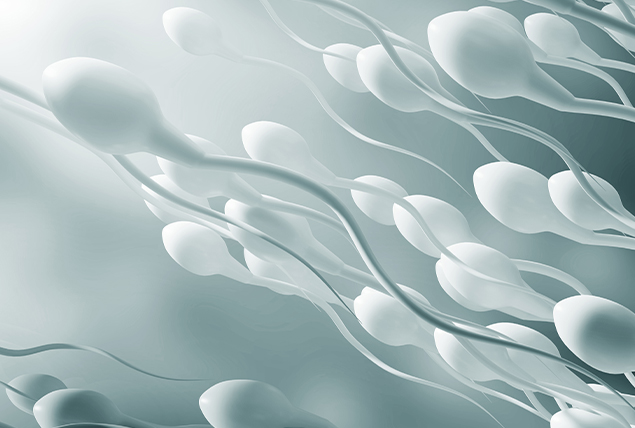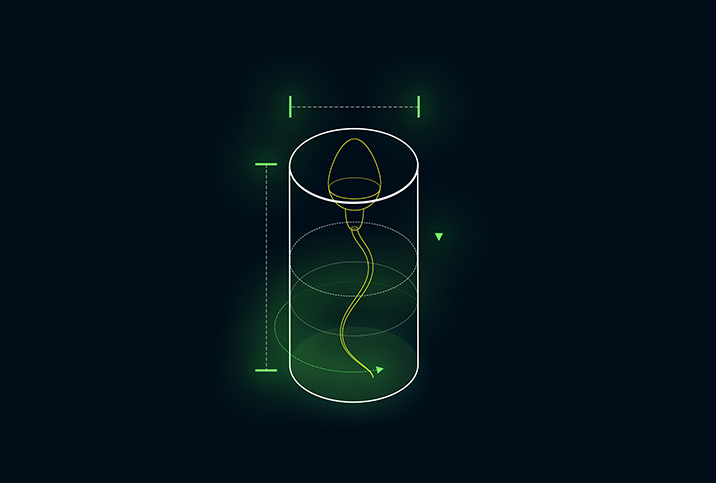How Long Does A Sperm Live?

Despite carrying the fate of humanity on its metaphorical shoulders, the mighty sperm does not fare well outside of its preferred environment of the female reproductive tract.
In fact, in the male urethra, sperm can only live for a few minutes.
"The male urethra is not designed to support sperm survival, as it is exposed to acidic urine and other factors that can hinder sperm viability and survival," said Justin Houman, M.D., a reproductive urologist and men's health specialist at Tower Urology in Los Angeles and the medical director for Bastion Health, an app-based telehealth platform for men.
Within the confines of the female reproductive tract, however, sperm can survive for much longer, sometimes for days.
Here's more information about the lifespan of sperm, including how long sperm can live outside the body, on the skin or in a condom.
The life cycle of sperm
The entire life cycle of sperm—a process called the spermatogenesis cycle—lasts about 72 days, said Michael Werner, M.D., the medical director and founder of Maze Sexual & Reproductive Health, based in New York City and Purchase, New York.
That means that it takes about 72 days from start to finish for mature sperm to be stored in the testes. Once there, they can live for about 16 days. However, because spermatogenesis is a constant process Werner noted, there will be a mix of older and younger sperm at any given point in time.
How long does sperm live outside the body?
The answer to how long sperm can live outside the body depends on where the sperm lands—literally. The lifespan of sperm refers to the period during which sperm remains viable and capable of fertilizing an egg, Houman explained, but that lifespan differs significantly depending on what environment the sperm is in.
"Once ejaculated outside of the body, sperm faces harsh conditions and its lifespan significantly diminishes," he said.
How long sperm can live depends on several factors, Houman said, such as the following:
- Exposure to harmful substances
- pH levels
- Temperature
- The presence of cervical mucus in the female reproductive tract
"Optimal conditions can extend sperm's lifespan, while adverse factors can lead to reduced viability and survival time," Houman said.
The reason sperm doesn't live very long outside of the body is because it's contained in semen, but once exposed to air and pH changes, semen quickly breaks down, exposing the sperm and ushering in a relatively swift death, Werner noted.
The best chance sperm has for survival is to be ejaculated directly into the vagina at the right time, where it can live for several days. However, even the vagina can be a harsh environment for sperm.
"Most sperm actually die very quickly when exposed to the vaginal environment, and only the healthiest sperm move on," Werner said. "The amount of sperm that make it to the fallopian tubes is only a tiny fraction of the total in an ejaculate."
At what point a woman is in her menstrual cycle also impacts sperm survival. For instance, if she is not approaching ovulation, her cervical mucus may not welcome the sperm and could kill them.
"Some will survive but remain in the cervical mucus about four days after intercourse," Werner said. "In a normal healthy couple, only up to about 1,000 sperm ever make it to the fallopian tubes and near an egg."
Sperm have even lower chances of survival outside of the vagina. Here's a breakdown of sperm survival times, according to Houman:
- Sperm can live for minutes inside the male urethra.
- Sperm can live on surfaces, such as tissues, for minutes to hours.
- Sperm can live in a condom for a few hours.
- Sperm can live inside the female reproductive tract for up to five days.
Healthier sperm doesn't necessarily equal longer-living sperm, Houman said. While it's true that healthy sperm can live for days in the right conditions, sperm viability is influenced by a variety of factors, and a long lifespan alone does not ensure a sperm's health.
Additionally, there is some evidence—including research published in July 2021—that the female reproductive tract selectively "chooses" which sperm to move along and potentially fertilize a waiting egg. It should also be noted that the exact processes by which sperm can potentially survive for up to five days aren't completely understood.
When and why can sperm live longer?
There's a reason sperm live longer within the cervical embrace of the female reproductive tract, and that reason is reproduction.
"The evolutionary advantage of sperm having the ability to live up to several days lies in enhancing the chances of successful fertilization," Houman said.
Because a female egg only lives for about 24 hours after it is released, it has the best chance of being fertilized if there are plenty of sperm ready and waiting in the fallopian tubes. The journey to get through to the fallopian tubes can take days, hence the need for sperm to survive for the long haul.
"By persisting in the female reproductive tract, sperm can be ready and available to fertilize the egg during ovulation, even if intercourse occurred a few days earlier," Houman said. "This extended lifespan improves the odds of conception and supports successful reproduction."
While the ultimate goal of sperm survival may be reproduction, that doesn't necessarily mean that pregnancy is an easily achieved goal, even for the strongest of sperm. For instance, Werner debunked the common myth about pregnancy resulting from a toilet seat or being picked up from another hard surface, or even within a hot tub.
Even if sperm can survive on the outside, he explained, they're usually not able to make it on the inside after that.
"Deprived of a healthy medium, [sperm] probably won't live more than a few hours," Werner said. "The odds of them transferring from that surface into a reproductive tract and causing pregnancy—the ‘toilet seat theory'—is pretty impossible."
Sperm may not appear to be the longest-surviving organism, but to paraphrase a fictional mathematician, "Nature does seem to find a way." So for anyone looking to avoid pregnancy for the time being, both Werner and Houman recommended appropriate birth control for pregnancy prevention.
That could include barrier methods that stop sperm from entering the female reproductive tract, hormonal methods that suppress ovulation in females and emergency contraception that can help stop implantation of a fertilized egg.
No matter what your goal with sperm is—pregnancy avoidance or achievement—be sure to talk to your doctor and follow all recommended methods for your own personal needs.


















